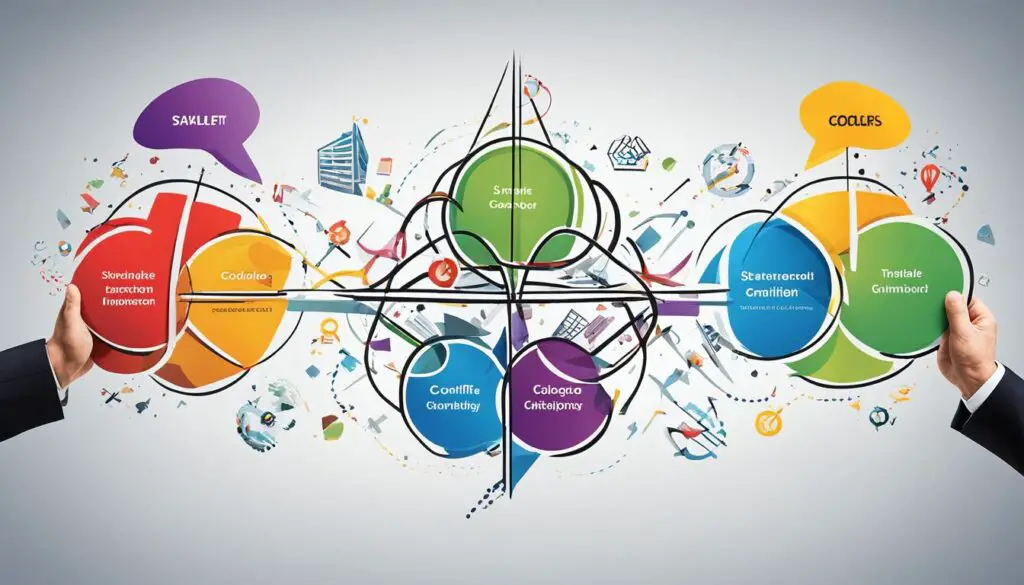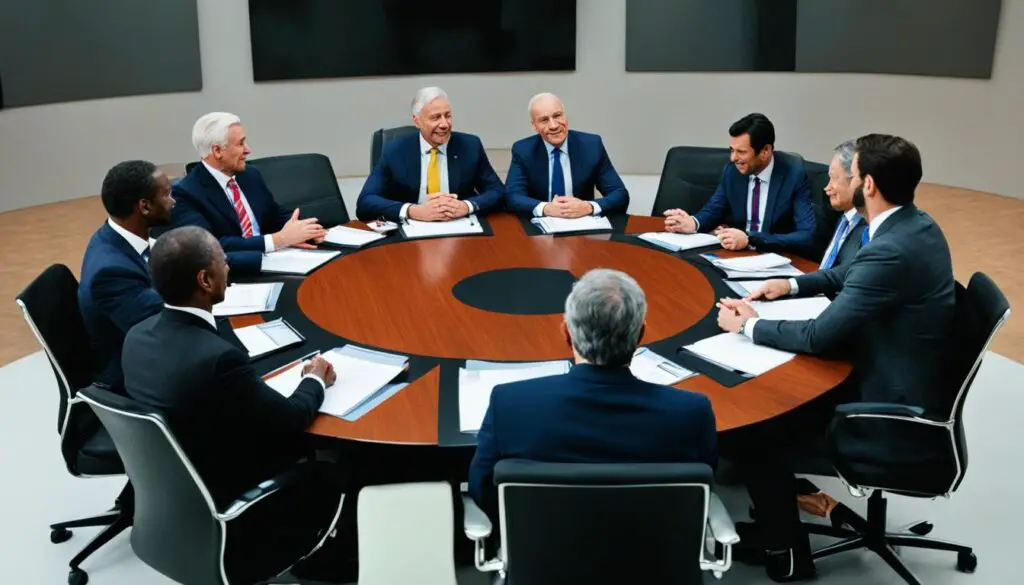Conflict resolution is a critical skill in any workplace setting. It involves the ability to address and resolve conflicts that may arise between individuals or teams. By employing effective conflict resolution strategies and utilizing problem-solving skills, individuals can navigate disputes and foster harmony and understanding in every interaction.
Key Takeaways:
- Conflict resolution is essential for maintaining a positive and productive work environment.
- Employing conflict resolution strategies can help address and resolve conflicts effectively.
- Problem-solving skills are crucial in navigating conflicts and finding mutually beneficial solutions.
- Effective communication plays a vital role in conflict resolution.
- Developing conflict resolution skills can lead to improved relationships and increased collaboration.
Common Causes of Conflict in the Workplace
Workplace conflicts can arise due to various factors that contribute to a tense and unproductive atmosphere. Understanding the root causes is essential for effective conflict resolution and creating a harmonious work environment. The following are common causes of conflict in the workplace:
Poor Communication
Effective communication is the foundation of a successful workplace. When communication channels break down or become ineffective, misunderstandings can occur, leading to conflicts. Insufficient information sharing, lack of clarity, and misunderstandings contribute to poor communication and conflict.
Unclear Performance Expectations
When employees are unsure about their roles and responsibilities or have unclear performance expectations, conflicts can arise. This can lead to frustration, confusion, and a sense of unfairness among team members, resulting in conflicts and decreased productivity.
Time Management Issues
Poor time management can result in missed deadlines, delayed project completion, and increased stress levels. When team members are unable to effectively manage their time, conflicts can arise due to the added pressure and frustration caused by delays or inadequate performance.
Uncertainty in Employee Roles
Workplace conflicts can occur when there is ambiguity or overlapping responsibilities within a team. Unclear employee roles can lead to confusion, power struggles, and conflicts over decision-making authority, causing tensions among team members.
It is crucial for leaders to address these causes of conflict and provide effective resolutions to maintain a positive work environment. By promoting open communication, setting clear performance expectations, emphasizing proper time management, and defining employee roles, organizations can reduce conflicts and foster a collaborative and productive workplace.
| Causes of Workplace Conflict | Impact on the Work Environment |
|---|---|
| Poor Communication | Breakdown in teamwork, misunderstandings, increased tension |
| Unclear Performance Expectations | Confusion, frustration, decreased motivation |
| Time Management Issues | Missed deadlines, decreased productivity, increased stress levels |
| Uncertainty in Employee Roles | Power struggles, confusion, decreased cooperation |
Key Conflict Resolution Skills
Developing key conflict resolution skills is essential for effectively managing conflicts in the workplace. By honing these skills, leaders can successfully address conflicts and resolve them in a productive and positive manner.
Problem-Solving Abilities
One essential conflict resolution skill is problem-solving abilities. Leaders must have the capacity to analyze the underlying issues causing the conflict and come up with practical solutions that address the root cause. By approaching conflicts with a problem-solving mindset, leaders can navigate complex situations and find mutually beneficial resolutions.
Effective Communication Techniques
Effective communication is another critical skill for conflict resolution. Leaders should be able to convey their thoughts clearly, actively listen to others’ perspectives, and foster open dialogue. By practicing effective communication techniques, such as active listening, nonverbal cues, and empathy, leaders can enhance understanding, build rapport, and find common ground.
Emotional Intelligence
Emotional intelligence plays a crucial role in conflict resolution. It involves being aware of one’s own emotions and those of others, and managing them in a constructive way. Leaders with high emotional intelligence can understand and empathize with the emotions of others, defuse tense situations, and foster a positive and collaborative work environment.
“Emotional intelligence allows leaders to approach conflicts with empathy and understanding, enabling them to find win-win solutions that benefit all parties involved.”
Active Listening
Active listening is a vital conflict resolution skill that encourages open and respectful communication. Leaders should practice active listening by giving their full attention, reflecting on and clarifying what they have heard, and validating the speaker’s feelings and perspectives. Active listening promotes understanding, reduces misunderstandings, and builds trust.

By developing and honing these conflict resolution skills, leaders can effectively address conflicts in the workplace, promote collaboration and productivity, and create a positive work environment conducive to growth and success.
Top 5 Conflict Management Strategies
Conflict is an inevitable part of any workplace, but effective conflict resolution techniques can help maintain harmony and productivity. Here are the top 5 conflict management strategies that leaders can employ:
- Addressing the Conflict: The first step in resolving conflicts is acknowledging and addressing them directly. By openly acknowledging the existence of a conflict, leaders can create a safe environment for open communication and problem-solving.
- Clarifying the Issue: It is important to identify the underlying cause of the conflict. By clarifying the specific issue causing the conflict, leaders can ensure that all parties involved have a clear understanding of the situation and avoid further misunderstandings.
- Bringing the Parties Together: Facilitate a meeting or discussion where the involved parties can express their viewpoints, concerns, and perspectives. Encourage active listening and open dialogue to foster understanding and empathy.
- Identifying a Solution: Collaboratively work towards finding a mutually acceptable solution. Encourage brainstorming and consider compromise or alternative approaches that meet the interests of all parties involved.
- Monitoring and Following Up: After a resolution has been reached, it is crucial to monitor the situation and follow up with the parties involved to ensure that the conflict has been effectively resolved. This ongoing support helps maintain healthy relationships and prevent future conflicts.
By utilizing these conflict management strategies, leaders can promote collaboration, find mutually beneficial solutions, and maintain healthy relationships among team members. Effective conflict resolution techniques not only resolve conflicts but also contribute to a positive and productive work environment.

Role of Emotional Intelligence in Conflict Resolution
Emotional intelligence plays a significant role in conflict resolution. It refers to the ability to understand and manage one’s own emotions, as well as empathize with the perspectives of others. In the context of workplace conflicts, leaders with high emotional intelligence have the capacity to effectively manage difficult conversations, handle conflicts with empathy and understanding, and create a positive work environment.
When faced with workplace conflicts, individuals with strong emotional intelligence can regulate their own emotions, avoiding impulsive reactions that may exacerbate the situation. Instead, they can approach conflicts with a calm and composed demeanor, promoting open dialogue and constructive problem-solving.
Moreover, emotional intelligence enables leaders to empathize with the emotions and viewpoints of others involved in the conflict. By acknowledging and understanding different perspectives, leaders can demonstrate empathy and establish a safe space for expressing concerns and finding common ground.
“Emotional intelligence is not only about understanding and managing our own emotions but also understanding others’ emotions and effectively managing interpersonal relationships.”
Leaders with high emotional intelligence possess the self-awareness to recognize their own biases, triggers, and hot-button issues that might influence their decision-making during conflict resolution. They can keep their emotions in check and approach conflicts objectively, ensuring fair and unbiased resolutions.
Developing emotional intelligence skills is essential for successful conflict resolution. Individuals can enhance their emotional intelligence through self-reflection, self-awareness exercises, and empathy-building activities. By continuously refining their emotional intelligence, leaders can navigate workplace conflicts with grace, sensitivity, and a focus on maintaining positive relationships.
Benefits of Emotional Intelligence in Conflict Resolution:
- Improved communication and understanding
- Enhanced conflict resolution skills
- Fostered collaboration and teamwork
- Promoted psychological safety in the workplace
- Reduced tension and animosity
By prioritizing emotional intelligence in conflict resolution, leaders can foster a harmonious work environment, build stronger relationships amongst team members, and promote productivity and satisfaction.

| Emotional Intelligence in Conflict Resolution | Key Attributes |
|---|---|
| Self-Awareness | Recognizing one’s own emotions, biases, and triggers |
| Self-Regulation | Managing emotions and avoiding impulsive reactions |
| Empathy | Understanding and empathizing with others’ emotions and perspectives |
| Effective Communication | Conveying thoughts and emotions clearly and respectfully |
| Conflict Management | Resolving conflicts with empathy, fairness, and understanding |
Conflict Resolution in Leadership
Conflict resolution is an indispensable aspect of effective leadership. Leaders play a crucial role in managing conflicts and fostering a harmonious work environment. By utilizing conflict management skills, leaders can address conflicts with professionalism and fairness, ensuring a positive outcome for all parties involved.
Leaders must lead by example and demonstrate the importance of conflict resolution in the workplace. By modeling effective conflict resolution techniques, leaders inspire their team members to adopt similar approaches in resolving disputes. This creates a culture of open communication and encourages employees to address conflicts promptly and constructively.
Providing training and development opportunities for leaders is essential in equipping them with the necessary conflict resolution skills. Leadership training programs can offer insights into conflict management strategies, effective communication techniques, and the art of fostering collaboration. By investing in leadership development, organizations empower their leaders to navigate conflicts successfully and promote a culture of understanding.
Training is not only valuable for leaders but also for the entire team. By providing conflict resolution training to all employees, organizations promote a shared understanding of conflict resolution principles and techniques. This ensures that conflicts are addressed consistently and effectively across the organization, mitigating the escalation of disputes and promoting a healthy work environment.

Effective conflict resolution is a vital skill for leaders at all levels of an organization. By embracing conflict management skills, leading by example, and providing training and development opportunities, leaders can create a workplace culture that values open communication, collaboration, and mutual respect. This not only resolves conflicts but also fosters a positive and productive work environment for everyone.
Providing Training and Development Opportunities
Creating a harmonious and inclusive work environment requires organizations to provide training and development opportunities for their employees. These programs play a crucial role in equipping individuals with essential skills, such as conflict resolution training, workplace training, and development programs, that contribute to effective human relations within the workplace.
Conflict resolution training is particularly valuable in helping employees develop the skills necessary to address and resolve conflicts that may arise in the workplace. By understanding conflict dynamics and learning effective techniques for resolving disputes, employees gain the confidence and knowledge needed to navigate challenging situations with empathy and respect.
“Conflict resolution training equips employees with the tools and strategies they need to address and resolve conflicts in a constructive and productive manner.”
Workplace training programs also promote awareness and understanding of important workplace dynamics. They provide employees with insights into communication styles, cultural sensitivity, and diverse perspectives, fostering an environment that values and respects differences. By promoting mutual understanding and appreciation, workplace training programs contribute to improved collaboration and positive employee relations.
Development programs encompass a broader range of professional growth opportunities. These programs may focus on leadership development, enhancing problem-solving abilities, and improving interpersonal skills. By investing in their employees’ professional growth, organizations create a workforce that is equipped with the necessary skills to excel in their roles and contribute effectively to a positive work environment.
Table: Benefits of Training and Development Opportunities
| Benefits | Description |
|---|---|
| Enhanced Conflict Resolution | Equips employees with conflict resolution skills to address and resolve conflicts effectively. |
| Improved Communication | Enhances workplace communication, leading to clearer understanding and reduced misunderstandings. |
| Fosters Positive Human Relations | Creates an environment of respect and inclusivity, strengthening relationships among employees. |
| Professional Growth | Facilitates skill development and career progression, increasing job satisfaction and motivation. |
| Increased Productivity | Equips employees with the necessary tools and knowledge to perform their roles efficiently. |
By investing in conflict resolution training, workplace training, and development programs, organizations can effectively address and prevent conflicts, leading to a more productive and satisfied workforce.
Leveraging Conflict Resolution Skills for Career Growth
Developing and leveraging conflict resolution skills can have a significant impact on both resolving conflicts in the workplace and advancing your career. By mastering conflict resolution techniques, you can enhance your leadership capabilities, improve your problem-solving and communication skills, and increase your effectiveness in team collaborations.
Conflict resolution skills are highly valued in today’s workplace, as they foster a positive and productive work environment. Employers appreciate individuals who can effectively address and resolve conflicts, as it minimizes disruptions, promotes collaboration, and strengthens relationships among team members.
Enhancing Leadership Capabilities
Conflict resolution skills are closely tied to leadership development. As you strengthen your ability to handle conflicts, you also improve your leadership qualities. Effective conflict resolution requires strong communication, active listening, empathy, and the ability to facilitate productive discussions. These skills are essential for successful leadership, enabling you to inspire and motivate your team towards common goals.
Leaders who possess exceptional conflict resolution skills can foster a culture of open dialogue, trust, and respect. By mediating conflicts and finding mutually beneficial solutions, you demonstrate your leadership potential and build a reputation as a fair and effective leader.
Improved Problem-Solving and Communication Skills
Conflict resolution requires identifying the root causes of conflicts and working towards finding sustainable solutions. This process enhances your problem-solving abilities as you analyze complex situations, consider multiple perspectives, and devise creative strategies to resolve conflicts.
Additionally, conflict resolution relies on effective communication techniques. Through conflict resolution training, you can develop crucial communication skills, such as active listening, assertiveness, and clear expression of ideas. These skills not only enable you to navigate conflicts successfully but also enhance your overall communication capabilities, both in the workplace and in personal interactions.
Opening Doors to Advancement and New Opportunities
Employers recognize the value of conflict resolution skills and seek individuals who can manage and resolve conflicts effectively. Having these skills positions you as a valuable asset within your organization, increasing your potential for career growth and advancement.
By demonstrating your proficiency in conflict resolution, you can stand out among your peers and become a sought-after team member. Your ability to handle complex situations, diffuse tensions, and find win-win solutions can lead to new opportunities, promotions, and increased responsibilities in your career.
Conflict resolution skills go beyond resolving disputes – they contribute to your professional growth and success. By honing these skills, you can position yourself as a capable and efficient leader, and enhance your career prospects in today’s highly competitive workplace.
Conclusion
Effective conflict resolution strategies and techniques are crucial for creating a positive and productive work environment. By proactively addressing conflicts with empathy and employing key skills such as problem-solving and effective communication, leaders can nurture improved relationships and increased collaboration among team members. The investment in conflict resolution training and development opportunities further enhances these skills and contributes to personal and professional growth.
Conflict resolution plays a vital role in maintaining workplace satisfaction and preventing the escalation of disputes. By fostering a culture of open dialogue and providing tools for conflict resolution, organizations can create an environment where conflicts are seen as opportunities for growth rather than obstacles. Employing these strategies enables individuals to navigate conflicts with fairness and understanding, leading to improved teamwork and overall job satisfaction.
As the modern workplace evolves, the ability to effectively manage conflicts becomes even more critical. By staying abreast of contemporary issues and challenges in conflict resolution, leaders can adapt their strategies to address emerging concerns. By continuously improving conflict resolution techniques and staying committed to creating a harmonious work environment, organizations can thrive in the face of challenges and foster a culture of collaboration and success.
FAQ
What is conflict resolution?
Conflict resolution refers to the process of effectively addressing and resolving conflicts that arise between individuals or teams in the workplace. It involves utilizing problem-solving skills and employing conflict resolution strategies to navigate disputes and foster harmony and understanding.
What are the common causes of conflict in the workplace?
Workplace conflicts can stem from various factors, including poor communication, unclear performance expectations, time management issues, and cloudy definitions of employee roles. These issues can create confusion, toxicity, and a sense of unfairness among team members.
What are key conflict resolution skills?
Key conflict resolution skills include problem-solving abilities, effective communication techniques, emotional intelligence, and active listening. By honing these skills, individuals can successfully address conflicts and resolve them in a productive and positive manner.
What are the top 5 conflict management strategies?
The top 5 conflict management strategies are addressing the conflict, clarifying the issue causing the conflict, bringing the involved parties together to talk, identifying a solution, and monitoring and following up. By utilizing these strategies, leaders can promote collaboration, find mutually beneficial solutions, and maintain healthy relationships among team members.
What is the role of emotional intelligence in conflict resolution?
Emotional intelligence plays a significant role in conflict resolution. It involves understanding and managing one’s own emotions and empathizing with others’ perspectives. Leaders with high emotional intelligence can effectively manage difficult conversations, handle conflicts with empathy and understanding, and create a positive work environment.
How does conflict resolution apply to leadership?
Conflict resolution is an important aspect of leadership. Leaders must possess conflict management skills to address conflicts in a professional and effective manner. Leading by example, providing training and development opportunities, and promoting a culture of open communication are crucial for successful conflict resolution within a leadership role.
How can organizations provide training and development opportunities for conflict resolution?
Providing training and development opportunities for employees is vital in creating a harmonious and inclusive work environment. Training programs can equip employees with conflict resolution skills, raise awareness about workplace dynamics, and foster positive human relations. By investing in these opportunities, organizations can effectively address and prevent conflicts, leading to a more productive and satisfied workforce.
How can conflict resolution skills contribute to career growth?
Developing and leveraging conflict resolution skills can not only resolve conflicts in the workplace but also contribute to career growth. By mastering conflict resolution techniques, individuals can enhance their leadership capabilities, increase their effectiveness in team collaborations, and improve their problem-solving and communication skills. Conflict resolution skills are highly valued in today’s workplace and can open doors to advancement and new opportunities.
Why is effective conflict resolution important?
Effective conflict resolution is essential for maintaining a positive and productive work environment. By employing conflict resolution strategies and developing key skills, leaders can address conflicts in a proactive and empathetic manner, leading to improved relationships, increased collaboration, and overall workplace satisfaction. Investing in conflict resolution training and providing opportunities for development can further enhance conflict resolution skills and contribute to personal and professional growth.
















